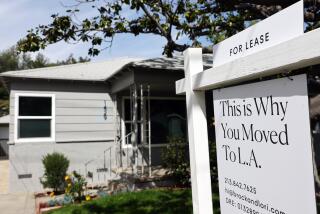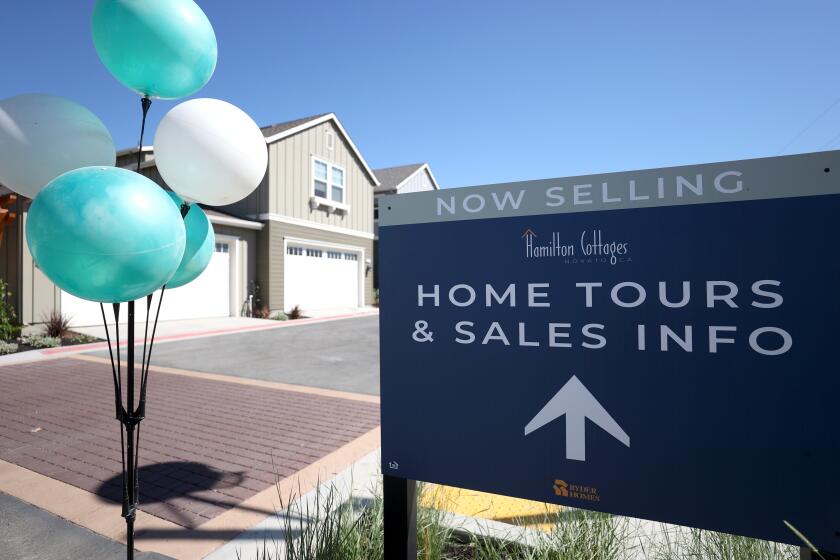Rentals That Seniors Can Afford : Public-Private Program Provides No-Frills Apartments in Established Neighborhoods
After years of living in their own house in Monrovia, Chester and Charlotte Owens are renting a two-bedroom apartment in Heritage Park Monrovia, one of the latest efforts to provide affordable housing for senior citizens in the Southland.
“We’re close to shopping and medical care and the friends we made during the years we lived in Monrovia,” Chester Owens said. Added Charlotte: “This apartment has everything we want, in a neighborhood we know and like.”
Maggie Fox, 76, lived in a mobile-home park before moving to Heritage Park Monrovia. She wanted the freedom from maintenance that’s part of apartment living.
“I got tired of the expense of repairs and the yard work,” Fox said. “I decided to become a renter after seeing the clubhouse and pool at Heritage Park.”
Heritage Park Monrovia is the first phase of a public-private effort to fill a major housing gap--affordable apartments for senior citizens priced out of the Southland rental market.
Developed by the nonprofit Corporate Fund for Housing (CFH) of Culver City, Heritage Park Monrovia provides no-frills rental units in a setting that is virtually indistinguishable from market-rate projects, according to CFH President Fred Kahane.
Besides the 241-unit Heritage Park Monrovia project, where the monthly rental range is $380 to $670, CFH is opening a 149-unit complex this week in Diamond Bar and is developing three other projects for residents 62 and older that will provide a total of 845 rental units, Kahane said.
Because the projects are in areas (Monrovia; Diamond Bar; Whittier, 169 units; La Verne, 85 units, and Lakewood, 201 units) where market rents are at or below low-income rents, all of the units will remain affordable, he said.
About half the units in the five projects will be for low-income seniors--those who earn 80% of the median annual income--with the rest available at moderate rents. Basically, the income range of tenants is between $15,000 and $20,400 a year, Kahane said.
The Corporate Fund for Housing was formed in 1985 with a grant from the federal Department of Housing and Urban Development and with the assistance of Mark Pisano, executive director of the Southern California Assn. of Governments (SCAG).
“SCAG studies showed us that creative solutions had to be developed for senior and low-income housing, so we formed CFH,” Kahane said.
“Southern California has a chronic shortage of affordable rental housing, reflected in a countywide vacancy rate of about 2%, compared to the 4% to 7% rate of a healthy housing market,” he said.
“With SCAG’s help, CFH was formed to fill the gap left by the winding down of federal housing developments.”
Turned to Bond Issues
CFH’s board chairman is William F. McKenna, partner emeritus of the Los Angeles law firm of McKenna, Conner & Cuneo, and board members includes Los Angeles Mayor Tom Bradley, former U.S. Sen. John Tunney and developer Ray Watt.
Kahane said that with most incentives to provide funding for non-subsidized senior citizen rental housing eliminated by the 1986 Tax Reform Act, CFH turned to bond issues to finance its senior housing.
After working with the Los Angeles County Housing Authority for almost a year, CFH last summer got authority for a $57.5-million county bond issue to develop the five apartment projects.
The builder of the projects, Calmark Development Corp., chose the locations. All are in-fill sites in close-in communities that need affordable rental housing, Kahane said. The parcels of land also were relatively affordable, he said, permitting below-market rents.
Since 1977, Calmark has built more than 5,000 affordable senior housing units in California under its Heritage Park program. More than 2,500 units (including the CFH’s 845 units) are either in the planning or construction stages, according to Calmark senior vice president Michael Costa.
Costs Kept Down
Rents will be kept affordable in all five projects by state and federal restrictions and CFH’s nonprofit status. Local governments--cities and counties--help by providing trade-offs in the form of reduced parking requirements, higher densities and land cost write-downs to the developer to help keep costs down.
Calmark realizes its profit in the sale of the project to the local nonprofit housing corporation and charges a fee for managing the units.
All five CFH projects were designed by architect Kermit Dorius of Corona del Mar as clusters of two-story walk-up buildings, updated and restyled from designs common throughout Southern California since the 1940s and 1950s.
Dorius is experienced in designing housing for seniors and has done virtually all of Calmark’s projects, according to Kevin Payne of Calmark.
The stairs leading to the second story have wide treads and relatively low risers for safety and are designed with landings to allow older residents to make the ascent in comfort and safety. All first-floor units are designed for handicapped accessibility, with wider interior doors, lever handles instead of knobs and safety grab bars in the bathrooms.
Parking Standards Relaxed
The units range in size from about 500 square feet for one-bedroom apartments to just under 700 for the two-bedroom apartments.
Monrovia’s director of community development, Don Hopper, said Monrovia relaxed its parking standards of two spaces per dwelling unit to 0.7 per unit to allow Calmark to build more apartments on the 6-acre site.
“We recognized that a project with a minimum age of 62 would need less parking than a conventional apartment development, but we required the developer to provide a van or bus service for the residents,” he said.
Hopper’s department also suggested design changes to Calmark, including clustering the buildings differently to create meandering walkways.
Heritage Park Monrovia tenant Evelyn Montgomery, 76, moved from a Monrovia apartment building that had many young people as tenants.
Like others interviewed at Heritage Park, Montgomery had found it difficult to adjust to the mix, especially since she had lived in a senior citizen apartment project in Hemet with her late husband.
When she heard about Heritage Park, she put her name on the interest list. “I like the activities here and it’s close to my daughter,” he said. “They ought to have more places like this.”
DEVELOPING AFFORDABLE PROJECTS In the wake of the rapid escalation of Southland housing costs, along with the decline in HUD programs, there is an urgent need for developers willing to work with local nonprofit organizations to create affordable rental projects.
The developer should be able to meet certain guidelines:
Must be willing to produce and sell the project to a nonprofit organization working as a joint-venture partner.
Must be willing to give up long-term appreciation and to build 20% of the units for low-income occupancy in return for the better financing offered by nonprofit, tax-exempt mortgage revenue bonds. These low-interest bond funds are available when a nonprofit retains ownership and can be a source of construction and permanent financing.
Developers involved in governmental programs that impose long-term affordability restrictions on all or part of the units in a rental development may wish to turn the project over to a nonprofit corporation.
Fred Kahane, president of the Corporate Fund for Housing, is also president of the newly organized Southern California Assn. of Nonprofit Housing, an organization that includes the CFH and similar nonprofits. Information: (213) 216-9333.
AFFORDABLE HOUSING OPTIONS FOR SENIORS Senior citizens seeking affordable rental housing have more options than they had a few years ago, thanks to projects initiated by the Corporate Fund for Housing in several Southland communities
Heritage Park projects are open in Monrovia, 1024 Royal Oaks Drive; Diamond Bar, 23750 Highland Valley Road, and in Whittier, 12251 Washington Blvd. The La Verne project, at Bonita and Damien streets, is scheduled to open Oct. 1, while the Lakewood project, 3120 South St., will open around the beginning of 1990, according to Fred Kahane of the Culver City-based nonprofit firm.
There will be a total of 845 new one- and two-bedroom rental units in these developments. More information can be obtained by calling (800) 233-5788.
More to Read
Sign up for Essential California
The most important California stories and recommendations in your inbox every morning.
You may occasionally receive promotional content from the Los Angeles Times.






